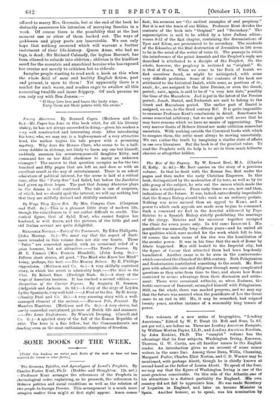SOME BOOKS OF TIIE WEEK.
"[Under this heading tee notice inch Books of the wee: as hay. not been reserved for review. in other forms.] The Sermons, Epistles, and Apocalypses of Israel's Prophets. By Charles Foster Kent, Ph.D. (Hodder and Stoughton. 12s. net.) —Professor Kent arranged the utterances of the Prophets in chronological order, explaining, as he proceeds, the 'references to Hebrew polities mid social conditions as well as the relation of the people to foreign Powers. This arrangement is a much more a:34mph): matter than might at first sight appear. Amos comes first ; his sermons are "the earliest examples of oral prophecy." But it is not the Amos of our Bibles. Professor Kent divides the contents of the book into "Original" and "Secondary." Ths superscription is said to be added by a later Judean editor; verses 9-12 of the first chapter, containing the denunciations of Tyro and Edom, are pronounced to be secondary. The misdeeds of the Edomites at the final destruction of Jerusalem in 586 seem to be in the mind of the writer of versa 11. The passage in which the interference of the priest Amaziah and the Prophet's reply are described is attributed to a disciple of the Prophet. On the whole, however, the prophecy is reckoned as "original." So is that of Hosea. When we coma to the Book of Isaiah we find ourselves faced, as might be anticipated, with some very difficult problems. Some of the contents of the book are attributed to the historical Isaiah, while some, as portions of iv., mull. &c., are assigned to the later Persian, or even the Greek, period ; xxiv., again, is said to be of "a very late date," possibly the time of the Maccabees. Joel is put in the latest of the Persian period ; Jonah, Daniel, and Zechariah are said to belong to the Greek and Maccabean period. The earlier part of Daniel is assigned, we see, to the third century B.C. It is quite impossible to examine Professor Kent's conclusions in detail. Sometimes he seems somewhat arbitrary ; but we are quite well aware that he may have reasons which we have no means of appreciating. The very narrow limits of Hebrew literature make criticism somewhat uncertain. With nothing outside the Canonical books with which to compare them, the critic must always be moving uncertainly. We can realise the truth by ima,ining a similar state of affairs in our own literature. But the book is of the greatest value. To read the Prophets with its help is to see in them much hitherto obscure or altogether hidden.














































 Previous page
Previous page